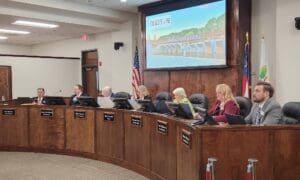Most of the public discussion about a proposed property tax increase at Thursday’s meeting of the Peachtree City Council focused on the increased spending for landscaping.
The average Peachtree City homeowner would face a $100 increase in property taxes, which would shore up funding for road and cart path maintenance along with improving landscaping efforts. The city has completely spent the last of its money from the 2004 transportation sales tax.
Responding to questions from a citizen, City Manager Jim Pennington said the $635,000 increase includes the addition of landscaping equipment plus the hiring of several crews of landscapers who would be city employees, bringing the operation back in house.
Pennington said citizens have complained numerous times about the poor quality and low frequency of landscaping conducted by contractors the past three years. The city undertook various efforts to work with those companies to improve quality, but the results were unsatisfactory, Pennington noted.
In the last three years, the city twice has had to dismiss a contractor in the middle of the year due to performance issues, Pennington added.
“We’ve tried every alternative,” Pennington said.
Beyond landscaping, the other lion’s share of the $1.72 million in projected revenue from the tax increase will nearly double the the city’s street paving budget by an increase of $717,000. Another $200,000 is being set aside for infrastructure improvements, mainly for bridge maintenance.
The city is also increasing its cart path construction budget by $75,000, adding $45,760 for litter removal by Keep Peachtree City Beautiful and $52,240 for technology improvements.
The budget also includes $405,000 set aside to account for potential salary increases from a citywide pay and classification study the city has funded.
The budget also presumes the use of a $3 million facilities bond to repair city facilities such as fire stations and the like. As savings, the budget eliminates funding for a public works director, a reduction of $85,000 though the position remains intact but unfilled.
As for the future, the millage rate would result in the city using about $350,000 in cash reserves over each of the next four years, which would leave the reserves still in a healthy position during the fifth year at 26 percent of the city’s overall annual budget. City policy requires those cash reserves to be kept at a minimum of 20 percent of the city’s annual budget.
The city is projecting to end this fiscal year with a fund balance of 33 percent, equal to about $10.26 million.










Leave a Comment
You must be logged in to post a comment.